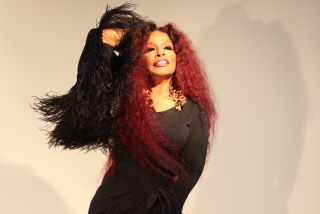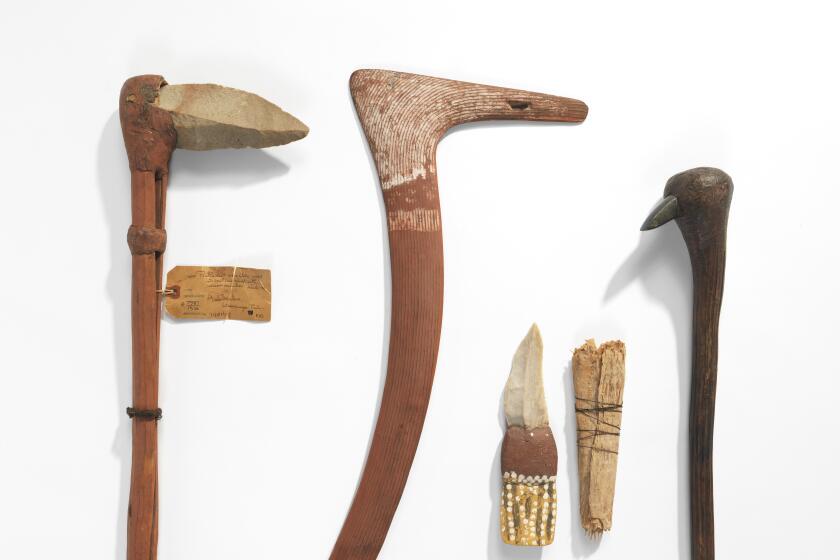MUSIC REVIEW : Simon Rattle Thinks Big in Hollywood Bowl Return
Tuesday nights have been quiet nights, for the most part, this summer at Hollywood Bowl.
The excitement level has remained relatively low. So have the attendance figures in our 18,000-seat amphitheater under the clouded stars.
All that changed this week. A big audience--the official tabulation reached 17,073--turned out to cheer Simon Rattle, nominal principal-guest conductor of the Los Angeles Philharmonic, as he led a mildly provocative, unusually ambitious program that paired Stravinsky’s 20-minute “Symphony of Psalms” with Beethoven’s 75-minute Ninth Symphony.
Perhaps the program was too ambitious. Rehearsal time is severely limited at the Bowl, where the Philharmonic often must muster three different programs within a four-day period. The performers’ concentration can be sorely tested, moreover, by extra-musical intrusions, from machines in the sky and from celebrants out front.
Microphones add an inevitably disconcerting element of distortion, and, if the climate is humid, proper intonation can become a sometime thing. The climate certainly was humid on this occasion.
The dauntless Philharmonic might have difficulty coping with all these variables even under the best of conditions. Noble intentions were probably compromised further on Tuesday by a certain aura of insecurity--Rattle isn’t a frequent visitor here any more--and by a certain aura of disorientation--the maestro chose an unorthodox seating plan that shuffled customary sonic relationships.
Only a cockeyed optimist would claim that this concert was an unalloyed triumph. Only a terminal curmudgeon, on the other hand, would fail to recognize its inherent virtues.
Rattle, now 36, mastered the rhythmic quirks, the linear complexities and the expressive pathos of Stravinsky’s psalm settings with suave aplomb, stressing the inherent lyricism wherever possible. The orchestra responded to his economical urgings with reasonable crispness, despite some moments of obvious nervousness. The Los Angeles Master Chorale, trained by John Currie, sounded a bit tentative.
After what felt like a premature intermission--always a problem when the Ninth is performed--Rattle offered his compelling views on Beethoven’s lofty symphonic valedictory. They are, quite naturally, modern views, and the views of a young man.
Rattle makes no effort to reproduce the poetic grandeur that Carlo Maria Giulini brought to the Ninth in Los Angeles, or the broad majesty that marked Kurt Sanderling’s reading. He concerns himself, instead, with intimacy of analytical detail, with heightened clarity of texture--some instrumental imbalance notwithstanding--and with steady propulsion.
He sustained brisk tempos and nimble articulation until the climactic choral apostrophe, “Seid umschlungen, Millionen!” (Be embraced, oh ye millions!). Here, he suddenly broadened both the pace and the dynamic scale, to striking effect.
Although the final rapturous cadences earned the usual ecstatic ovation, joy in this “Ode to Joy” was severely diminished by the Bowl sound system. It seemed as if the all-important vocal lines were being piped in shortwave from Sebastopol, then shattered in echo chambers and overamplified for the friendly folks in distant Glendale.
Three-quarters of the lightweight solo quartet, stationed high in the shell behind the orchestra, had been imported from Great Britain. The ludicrous implication is clear: The management of the Los Angeles Philharmonic thinks that American--never mind local--singers cannot do justice to the Beethoven Ninth.
One had to admire the limpid purity of Alison Hargan’s soprano, but Robert Tear, justly celebrated in character-tenor roles, found both the tessitura and the heroism of “Froh, wie seine Sonnen fliegen” an awkward strain. Like most of her colleagues and predecessors, Alfreda Hodgson could hardly assert herself in the ungrateful mezzo-soprano part.
Terry Cook, a minor Met basso from Plainview, Tex., sounded blustery and somewhat unsteady in the opening invocation. The Master Chorale dispatched the formidable choral duties with more power than finesse.
More to Read
The biggest entertainment stories
Get our big stories about Hollywood, film, television, music, arts, culture and more right in your inbox as soon as they publish.
You may occasionally receive promotional content from the Los Angeles Times.






